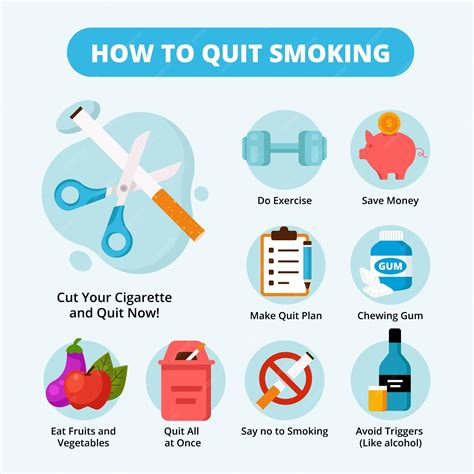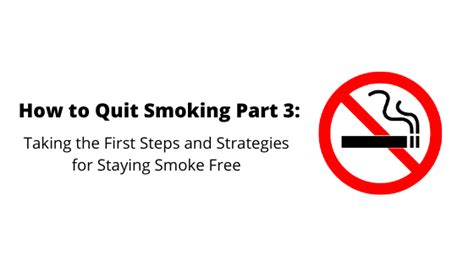Intro
Discover 5 effective ways to quit smoking, overcoming nicotine addiction with healthy alternatives, stress management, and support systems, for a smoke-free life.
Quitting smoking is a challenging task, but it is a crucial step towards improving one's health and well-being. Smoking is a leading cause of preventable deaths worldwide, and it is responsible for a significant number of diseases, including heart disease, stroke, and various types of cancer. Despite the risks, many people struggle to quit smoking due to nicotine addiction and the emotional attachment they have to the habit. However, with the right strategies and support, it is possible to overcome the addiction and live a healthier, smoke-free life.
The benefits of quitting smoking are numerous, and they can be felt immediately after quitting. Within 20 minutes of quitting, the heart rate and blood pressure decrease, and the risk of heart attack begins to reduce. After 12 hours, the carbon monoxide levels in the blood decrease, and the oxygen levels increase. As time passes, the benefits of quitting smoking continue to accumulate, and the risk of developing smoking-related diseases decreases significantly. Moreover, quitting smoking can also improve one's appearance, breath, and overall quality of life.
Quitting smoking is not just about individual health benefits; it also has a positive impact on the environment and the people around the smoker. Secondhand smoke exposure can cause serious health problems, including respiratory diseases, cancer, and cardiovascular disease. By quitting smoking, individuals can reduce the risk of secondhand smoke exposure to their loved ones, friends, and colleagues. Furthermore, quitting smoking can also reduce the economic burden of smoking-related diseases on individuals, families, and society as a whole.
Understanding Nicotine Addiction

Factors Contributing to Nicotine Addiction
Several factors contribute to nicotine addiction, including: * Genetic predisposition: Some people may be more susceptible to nicotine addiction due to their genetic makeup. * Environmental factors: Exposure to smoking at a young age, peer pressure, and social norms can all contribute to nicotine addiction. * Psychological factors: Stress, anxiety, and other emotional issues can increase the risk of nicotine addiction. * Physical factors: Nicotine can alter the brain's chemistry, leading to physical dependence and withdrawal symptoms.Strategies for Quitting Smoking

Benefits of Quitting Smoking
The benefits of quitting smoking are numerous, and they can be felt immediately after quitting. Some of the benefits include: * Improved health: Quitting smoking can reduce the risk of smoking-related diseases, including heart disease, stroke, and various types of cancer. * Increased energy: Quitting smoking can improve lung function and increase energy levels. * Better appearance: Quitting smoking can improve skin health, reduce wrinkles, and improve breath. * Financial savings: Quitting smoking can save individuals a significant amount of money on cigarettes and healthcare costs.Overcoming Obstacles

Strategies for Overcoming Obstacles
Several strategies can help individuals overcome obstacles and stay on track with their quit plan. Some of the strategies include: * Seeking support: Seeking support from friends, family, or support groups can provide a sense of community and encouragement. * Staying active: Staying active can help reduce cravings and improve mood. * Practicing relaxation techniques: Practicing relaxation techniques, such as meditation or deep breathing, can help reduce stress and anxiety. * Rewarding progress: Rewarding progress can help motivate individuals to stay on track with their quit plan.Staying Smoke-Free

Benefits of Staying Smoke-Free
The benefits of staying smoke-free are numerous, and they can be felt immediately after quitting. Some of the benefits include: * Improved health: Staying smoke-free can reduce the risk of smoking-related diseases, including heart disease, stroke, and various types of cancer. * Increased energy: Staying smoke-free can improve lung function and increase energy levels. * Better appearance: Staying smoke-free can improve skin health, reduce wrinkles, and improve breath. * Financial savings: Staying smoke-free can save individuals a significant amount of money on cigarettes and healthcare costs.Conclusion and Next Steps

We encourage you to share your experiences and tips for quitting smoking in the comments below. If you have any questions or concerns, please do not hesitate to ask. Additionally, if you know someone who is trying to quit smoking, please share this article with them and offer your support. Together, we can help individuals overcome nicotine addiction and live a healthier, smoke-free life.
What are the benefits of quitting smoking?
+The benefits of quitting smoking include improved health, increased energy, better appearance, and financial savings. Quitting smoking can reduce the risk of smoking-related diseases, including heart disease, stroke, and various types of cancer.
How can I overcome nicotine addiction?
+Nicotine addiction can be overcome by using effective strategies, such as nicotine replacement therapy, counseling, support groups, and medications. It is also important to address the emotional and psychological factors that contribute to nicotine addiction.
What are some common obstacles to quitting smoking?
+Common obstacles to quitting smoking include withdrawal symptoms, cravings, social pressure, and emotional issues. However, these obstacles can be overcome by seeking support, staying active, practicing relaxation techniques, and rewarding progress.
How can I stay smoke-free?
+Staying smoke-free requires a long-term commitment to a healthy lifestyle. Strategies for staying smoke-free include avoiding triggers, staying active, practicing healthy habits, and seeking support from friends, family, or support groups.
What are some resources available to help me quit smoking?
+There are many resources available to help individuals quit smoking, including counseling, support groups, nicotine replacement therapy, and medications. Additionally, there are many online resources and mobile apps that can provide support and guidance throughout the quitting process.
